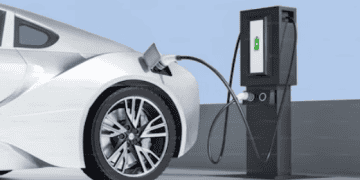Battery recycling is crucial to the UK’s ambition of establishing a sustainable supply chain for electric vehicle (EV) production. The Advanced Propulsion Centre (APC) is supporting several initiatives, including one by Altilium, aimed at creating a domestic, low-carbon source of critical minerals needed for EV batteries. The focus on battery recycling aligns with the UK’s objective of developing a circular economy, enabling the recycling and reuse of essential materials such as lithium, nickel, cobalt, and manganese found in batteries. This approach aims to reduce reliance on global supply chains while significantly lowering the carbon footprint associated with the production of new lithium-ion EV batteries.
In 2022, the APC, with backing from the Department for Business and Trade (DBT), allocated funding through the Automotive Transformation Fund (ATF) to enhance the business case for scaling up UK manufacturing in critical areas, including battery anode and cathode production, fuel cell stack assembly, and the viability of sourcing critical materials domestically for green technology. Among the beneficiaries of this funding was Altilium, a London-based clean technology firm dedicated to supporting the UK’s transition to net zero. The company received a portion of £9.4 million to explore the feasibility of establishing a novel industrial plant aimed at recovering critical metals from end-of-life EV batteries for reintegration into a circular battery supply chain.
This feasibility study has advanced Altilium’s plans for a new greenfield site in the UK, designed to process 150,000 end-of-life lithium-ion EV batteries annually, recovering around 30,000 tonnes of cathode active materials (CAM) for the EV battery industry. This recovery is projected to satisfy 20% of the anticipated UK demand for these materials by 2030. The APC estimates that by that year, over 160,000 tonnes of cathode-active materials will be required to meet domestic EV battery production demands. Although the UK lacks substantial quantities of these critical materials—historically dominated by other countries—there is a growing resource pool in the batteries of consumer vehicles. As vehicles reach the end of their lifespan, it becomes the manufacturers’ responsibility to ensure a sustainable recycling pathway for these products.
The extraction of raw materials for reintegration into new batteries completes a vital loop in the supply chain. Upcoming legislation will require car and battery manufacturers to incorporate a larger percentage of materials sourced from the UK and recycled materials into new EV battery production. Altilium has established partnerships with strategic players in the industry, who provide end-of-life batteries and production scrap. Once an EV battery reaches the end of its life, it can be discharged, dismantled, and processed to produce a fine powder known as ‘black mass,’ containing valuable metals and graphite. Altilium’s proprietary EcoCathode process recovers over 95% of critical metals from this black mass to produce CAM suitable for new battery production.
This process is more environmentally friendly, resulting in over 60% lower CO2 emissions and 20% lower costs compared to traditional raw material mining and shipping. It also facilitates the repeated recovery of materials, enabling a sustainable loop that allows for near-indefinite recycling of EV batteries. The initiative is essential for the UK to secure its automotive industry and the associated skilled jobs, supporting communities dependent on large manufacturing sites. By efficiently processing critical battery materials, the UK can enhance its battery supply chain and foster a self-sustaining, competitive industry.
Altilium stands out as the only UK company recovering minerals, including lithium, from waste EV batteries and repurposing them for high-nickel CAM used in modern battery technologies. With ATF funding, Altilium has successfully validated its technology at a laboratory level. In just 18 months, this support has helped transform an empty facility into an operational pilot line and analytical laboratory for mineral processing, leading to the establishment of an EV Battery Technology Centre in Devon. The company is now constructing a larger commercial pilot plant in Plymouth to produce high volumes of CAM for qualification by automotive manufacturers and to demonstrate the scalability of its process.
With millions of EV batteries expected to reach the end of their lifecycle in the coming decade, efficient and sustainable recycling presents both challenges and opportunities for the industry, paving the way for a future with minimal or no mining.
Discover top supply chain news stories at The Supply Chain Report. For international trade resources, head to ADAMftd.com.
#BatteryRecycling #CircularEconomy #SustainableTransport #EVInnovation #GreenTechnology















